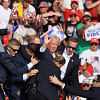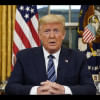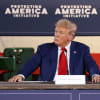Trump’s Xanadu: Power, spectacle, and the mirage of control

In Kubla Khan, Samuel Taylor Coleridge crafts—and perhaps even curates with an eerie instinct—the image of a wayward ruler bent not merely on governing his empire, but on mastering the very fabric of existence itself. This act of curation, drawn from a dream and infused with the opium haze of the unconscious, epitomises the Romantic imagination as a site of sublime excess and visionary power. Coleridge's Xanadu is not merely a political domain but a projection of the inner psyche, where reason and reverie collapse. The emperor's pleasure dome, encircled by tumultuous forces, becomes a haunting image of ambition undone by the chaos it attempts to subdue. This tension finds its uncanny echo in the political spectacle fashioned by US President Donald Trump, across the first chaotic 100 days of his second term, marked by an extravagant display of control ultimately unravelled by the contradictions that sustained it.
This tension reverberates on the modern political stage—the "Theatre of the Absurd," to borrow Martin Esslin's phrase—where Trump's administration, like Kubla Khan's empire, operates as a spectacle: a performance designed to project invincibility. Yet, just as the emperor's dome was surrounded by chaotic forces beyond his command, Trump's vision of an impervious America falters when confronted with the imbroglio of a global trade war, the dismantling of the global economic order, the retreat from globalisation, and mass deportations. His imagery is less an articulation of governance than a performance of control. This fleeting illusion lays bare the vagaries of perception and the vaingloriousness of power draped in the garb of permanence.
The spectacle of power: Reality and illusion
At the heart of Coleridge's poem lies the decreed pleasure dome, a manifestation of power and wealth, designed to dominate both land and imagination. Yet, it is a world "where Alph, the sacred river, meanders with a mazy motion through caverns measureless to man," teetering with unpredictable forces that elude imperial control. This duality between vision and uncontrollable forces reveals the instability and vacuity in the assertion of absolute control. Trump's promises—of "making America great again" (for the second, discontinued term-time), bringing jobs back (insourcing), pivoting away from China, renaming the Gulf of Mexico, annexing Canada, acquiring Greenland through Machiavellian coaxing, and retaking the Panama Canal—amount to more spectacle than substance. These assertions of control unravel not merely into fragile illusions, but into a fully fledged fiasco.
Take, for instance, the border wall, an enduring emblem of Trump's rhetoric. It was never merely about steel and concrete, but a declaration of will, a performance of sovereignty. Yet, it remained largely unfulfilled, thwarted by legal entanglements, logistical quagmires, and political resistance. Like a modern day pleasure dome, the wall was more mirage than monument—a spectacle that crumbled against bureaucracy, shifting public sentiment, and the inconvenient truth that the neighbouring country was neither beholden nor inclined to finance it.
Trump's illusion of control: Spectacle and strategy
Trump's foreign policy mirrors this illusory control. His relationship with Russia, framed as a triumph of negotiation, is riddled with contradictions and failures. His interactions with Putin expose the limits of his manoeuvring. Trump's transactional diplomacy mirrors his domestic policies: power as spectacle, not substance. Nowhere is this more evident than in his dealings with Israeli Prime Minister Benjamin Netanyahu. At times, Trump isn't the master but the pawn—most clearly in his failure to broker a lasting peace or a ceasefire between Hamas and Israel. Trump's acquiescence to Netanyahu's ploy highlights his inability to navigate entrenched conflicts, revealing the fragility of his posturing. Yet, many observers see him outmanoeuvring adversaries intent on undermining him, as in the renewed momentum around a potential US–Iran nuclear deal, nearly a decade after he jettisoned the Joint Comprehensive Plan of Action (JCPOA) at Netanyahu's insistence. This ambiguity underscores the challenge of discerning substance beneath the performance.
This view of politics mirrors the emperor's delusion of shaping the world through sheer will. But just as Kubla Khan's empire was surrounded by nature's "savage place," Trump's approach ignores global complexities. His policies assert dominance but fail to grasp the cascading complexities of diplomacy. The emperor's world collapses not from ambition but from hubris, blinded by arrogance and crippled by a failure of imagination.
The power of the poet: Imagination versus assertion
In contrast to the emperor, Coleridge places the poet as one who creates not through assertion, but imagination. Having "drunk the milk of Paradise," the poet upends power's territoriality and transcends its limits. The poet does not impose a vision; he allows the world to unfold. This is true power, rooted not in control but in the freedom of imagination.
In this lies the critical difference between fancy and imagination in Coleridge's terms. The poet's imagination is dynamic and organic, resonating deeply with the world's moral and metaphysical textures. The emperor's dome is the product of fancy, a surface-level construction mimicking power while hollow at its core. Trump, much like Kubla Khan, emerges as a ruler of fancy: his dominion is an assertion built on spectacle, lacking the coherence and transformative potential of genuine imagination. His rhetoric is loud—"more bark than bite," as Fareed Zakaria puts it—and void of the visionary substance that might engender transformative change.
It is crucial to note that Coleridge's dream fragment captures far more leaps of imagination than Trump's elusive presidency—fragmented and fanciful—could ever fathom: a phantom MAGAdu, a mirage of spectacle and delusion, cobbled from MAGA and Xanadu. In a world where poetic vision might offer transcendence, Trump's politics remained mired in reactive spectacle. Where Coleridge gestures toward sublimity, Trump settles for simulacra. His politics lacks the poetic resonance that might offer enduring meaning—it is all surface, no depth.
The collapse of the spectacle: Power and reality
Trump's administration serves as a reminder of the fragility of power when built on illusion. His narrative of strength and victory is increasingly exposed as hollow. Just as Kubla Khan's dome was surrounded by chaos, Trump's spectacle-driven empire is undermined by governance realities. His vision of America's dominance is not matched by the complexities of a changing world.
In the end, Trump's political vision, much like the emperor's, is vulnerable to collapse not from its ambition, but from ignoring deeper forces of complexity and resistance. Power rooted in fancy cannot withstand the forces it seeks to control. Both Trump's and Kubla Khan's empires embody the same truth: power, when divorced from imagination and understanding, is bound to fail.
There is a fundamental difference between Kubla Khan's decree to build a pleasure dome in Xanadu and Coleridge's imaginative vision that unfolds after "drinking the milk of Paradise," epitomising Plato's portrayal of the poet in Ion. Khan's "decree"—an imperial assertion—springs from fancy, grounded in reason and taste, gone haywire. His vision remains architectural and territorial, marred by ambition.
In contrast, Coleridge's visionary journey—induced by the "milk of Paradise"—belongs to imagination: not willed but received, not constructed but revealed. His dome is not a monument of dominion, but an echo of lost wholeness, a beauty glimpsed and then interrupted. The poem dramatises the contrast between imperial fantasy and poetic imagination, between power that commands and vision that transcends.
Dr Faridul Alam, a retired academic, writes from New York.
Views expressed in this article are the author's own.
Follow The Daily Star Opinion on Facebook for the latest opinions, commentaries and analyses by experts and professionals. To contribute your article or letter to The Daily Star Opinion, see our guidelines for submission.

 For all latest news, follow The Daily Star's Google News channel.
For all latest news, follow The Daily Star's Google News channel. 










Comments